#VERY DUBIOUS HISTORY. I WAS HIGH AND TIRED TO DO MAXIMUM RESEARCH
Explore tagged Tumblr posts
Text
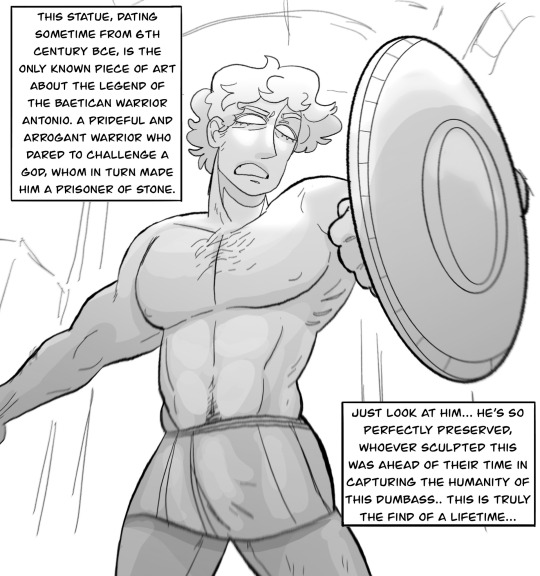
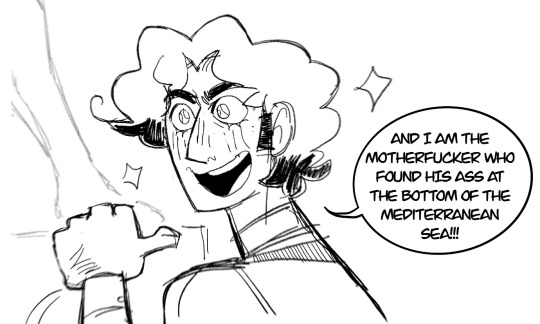
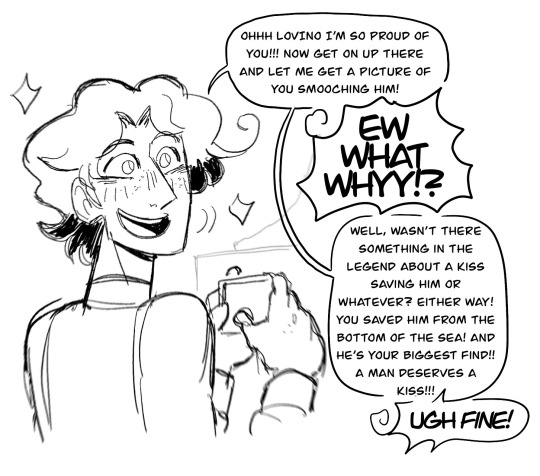
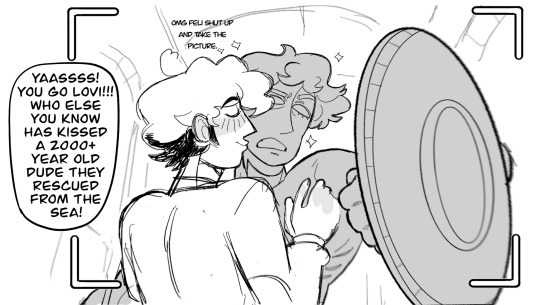
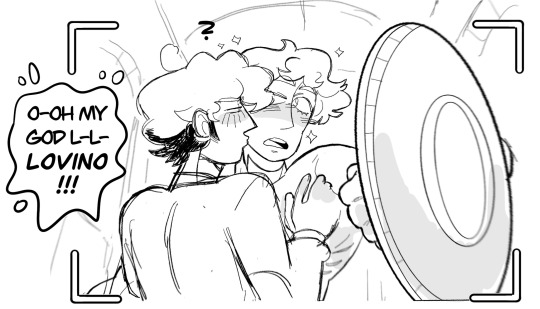
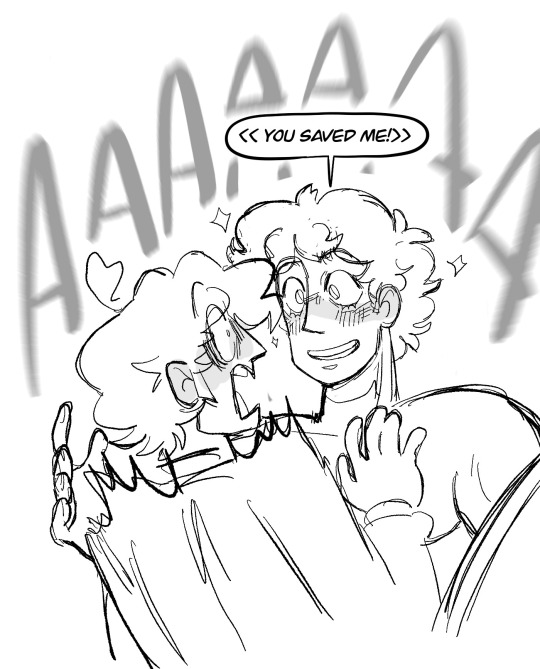
Legend has it that only a kiss of the one who may truly humble the dumbass warrior will free him from the imprisonment of stone ❤️
Sorry guys! On this blog there’s no order. Just random gay thoughts that pop into my head that I will hopefully draw more of later 😋💕
#speaks Ancient language at you and winks#‘WHAT DID HE SAY TO ME. WHY IS HE WINKING. HELP’#hetalia#aph spain#hws spain#aph romano#aph south italy#hws romano#hws south italy#spamano#hws veneziano#hws north italy#aph veneziano#aph north italy#also Lovino will humble his ass rq#but also make Antonio realize that there’s more to life than just being better than everyone else andkdkd#also let’s make ‘god’ ancient asshole England who’s a littol trickster#VERY DUBIOUS HISTORY. I WAS HIGH AND TIRED TO DO MAXIMUM RESEARCH
488 notes
·
View notes
Note
hey there, found your blog through a friend. ive been scanning your blog and patreon, and i felt like reaching out because, well... you're basically living my dream life, haha. i would love to do work like you do, rehabbing birds and training them, especially as companions/aids for disabled folks. pretty amazing! do you mind if i ask how you got started? is it an expensive venture? do you own farmland or live in a suburban area? im gonna send this before i take up too much of your time, haha. :)
I have raised ALL kinds of animals, but it was rats that lead me to pigeons.
I’ve had fish, herps, and inverts most of my life, so the way rats, mice, and Gerbils were able to bond with me felt really special.
Rats being the most intelligent and cooperatively social
When I had to stop raising small mammals, I wanted a pet that would similarly enjoy handling. Like, be happy/excited to see me when I got home, more than just wanting out.
Warm blooded, but non mammalian left birds.
Psitticines are wild animals that have needs WAY beyond our capability to meet, so they are all firmly on the no list.
I enjoyed Zebra finches, but my husband and I are sound sensitive, and he finds their song physically painful.
We can’t have chickens where we live...
Ringneck Doves ticked all the boxes for what I needed in a companion bird:
Docile/tractable Small/easy to house Easy to feed Physically incapable of biting or making painfully high pitched noises.
Turns out I was wrong about that last one! That’s pigeons. XD
We learned this with our first ringneck: An ANCIENT rescue and his wife named Nigel.
What a story those birds had!
My dear hubby was dubious about letting me raise another species, but after some shared research, was ok with me fostering some unwanted ones and finding them a new home.
I found them on Craig’s list, with cage and all.
When we went to pick them up, their owners explained that they had been unwanted, but traditional wedding gifts they felt they couldn’t refuse.
Ten years later, their owners had long ago gotten tired of caring for them, and just wanted them gone.
Their parents had purchased the pair when they retired from a magic show, and had had them as long as the couple could remember.
Having since sold white ringneck doves to magicians, I’ve learned that a trained dove retires between five and ten years of age, depending on temperament.
The parents were reported to have owned them for 15-20 years.
And the owners we picked them up from had had them for ten.
Making this pair of white Ringneck doves at LEAST 30 years old.
After this history, the wife brought them for us to take.
They were in a filthy black finch cage that had been left on their owner’s back porch long enough for a colony of fire ants to bring their own dirt and build a camp-nest in the bottom.
The birds were actively being swarmed and stung.
It took me a full thirty minutes to pull all of them off the two ancient doves...
It was touch and go for a bit, but they pulled through, and we found a home for the hen.
The cock, Nigel, had a twisted beak and the WORST coo!
High pitched and severely nasal, it could bore into your brain through ear plugs. >v<
He LOVED us, though, and liked to sing us the song of his people! At random. On Mike’s shoulder, directly into his ear. All hours of the night. During the day, up where we couldn’t reach him. Even through trying to shoo him off his favorite perch...
He had SO much personality, and even though his song caused both of us severe physical pain and prevented us from sleeping, we could not help growing to dearly love him back.
Mere weeks after my Dear Hubby decided he wanted Nigel to spend the rest of his life with us, his time ran out.
He passed very suddenly, in our arms.
We mourned him. Lamented having so little time.
And we considered where to go from there.
We decided to find a breeder, so we could get little peeps and have the maximum amount of time with what felt like the perfect pet for us.
I had no idea they could be parent raised and still be tame, so I raised that first pair like I had my Zebra finches in College.
We took them home just feathered enough to keep warm and fed them formula.
Gordon and Sasami were those babies.
And they were such a delight, we wanted nothing more than to share with the world how wonderful hand raised dove could be.
So I got the Dear hubby’s permission to seek out more breeding pair.
Between what I could buy and what I could raise, we ended up with 8, and then eventually 16 pair.
There was not much knowledge about keeping them as house pets, or their behavior, beyond what it took to get them to reproduce.
It was common at the time, and still is, to treat Ringneck Doves like small pigeons: Keeping them in large decorative flocks in an out door pen.
It was only through raising the young of my 16 pairs and letting them grow out free flying in the middle room of my home that I learned that these long since domesticated birds could be tamed through socialization from a young age, like a puppy.
But more importantly; just how vehemently anti-social they are!
One or two Ringneck Doves can be perfectly happy in an enclosure, but there should NEVER be more than two in any space where they can make physical contact!!!
They are VICIOUSLY territorial!
Every pair NEEDS to be an an individual enclosure, with ABSOLUTELY no way to make physical contact with any other bird, including and especially their own weanlings!
The second even their own peeps are fully self feeding, the parents start to mercilessly attack them, hell bent of driving out what they now see as an intruder invading their space and stealing their food and food from their future babies at any cost, up to and including killing them!
The actual Bird of Peace is the Rock Dove: the wild ancestor of the domestic Pigeon.
Two years after I started breeding doves, I started showing them. You can really only show doves in their own section of pigeon shows, and after seeing all the beautiful variation in pigeons, I was smitten.
I brought home my first pigeon egg from my second show: a Portuguese tumbler hen laid it in her show cage, and I was shocked to find that breeders usually just threw those away.

Pugsly was hatched by a pair of doves, and he was amazing.
Friendly, outgoing to the point of being obnoxious, adorably, delightfully funny.
SO much more personable than the doves!
At another show, I picked up some Classic Old Frills.
Them some Old German Owls a year later.
Then some Old dutch Capuchine.
The more breeds I worked with, the more fascinated I became with the differences in the temperaments of different breeds, and the more I found I enjoyed working with the pigeons.
I knew we had used pigeons for lots of interesting studies.
Like this one about the development of heart disease!
https://www.sciencedaily.com/releases/2006/07/060729133950.htm
This one, using training tosses of urban homing pigeons wearing special back packs to monitor lead pollution
https://www.sciencedaily.com/releases/2016/07/160719144733.htm
But these using their natural pattern recognition as a diagnostic tool for human diseases:
https://www.smithsonianmag.com/science-nature/pigeons-can-spot-breast-cancer-medical-images-180957323/?utm_source=facebook.com&no-ist
https://www.audubon.org/news/how-common-street-bird-could-coach-doctors-against-bad-diagnosis
Led me to finding this article.
https://www.audubon.org/news/the-origins-our-misguided-hatred-pigeons
And it hit me like a ton of bricks:
Pigeons are not native to North America.
European settlers and immigrants brought them.
They had already been domesticated for thousands of years by then.
There is no such thing as a Wild pigeon in North America.
They are the avian equivalent of the street dog problem in Mexico:
Generations of domesticated animals entirely dependent on human hand outs or left overs for survival, with no shelters to take them in or sterilization programs to prevent more unwanted individuals from being born into a hostile environment that can’t support their numbers.
As long as I have bred any species of animal, I have been active in rescue, rehabilitation, fostering, and finding homes for unwanted individuals of that species.
For me, the two just go hand in hand.
I started volunteering for the local wildlife rehab as soon as I started breeding, initially using my domestic doves (that will raise absolutely anything) to foster orphaned Mourning and Eursadian Collared Doves: hoping to prevent them from bonding to me so that they could be soft released.
When it became known that I raised pigeons, I started getting calls for them too.
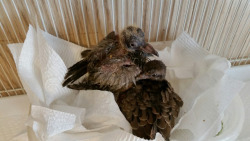
Ankhou was the first that needed really hands on care.
He arrived with a baby Mourning dove.
He and it were both recent orphans.
The wild native dove baby is well muscled, and the appropriate size for its age.
Ankhou, at 4 weeks old, should have looked like Pippin:

youtube
You can pretty accurately compare the difference between rehabbing a Mourning Dove and a Pigeon with the difference between rehabbing a grey fox kit and a stray puppy.
Like a grey fox, the Mourning dove is a native wild animal. It is absolutely vital to keep direct human interaction to the absolute minimum because developing a dependence on and friendliness towards humans will get them killed.
Either immediately and out right by hunters, or more slowly through malnutrition.
Puppies are not expected to survive in the wild, and absolutely NO rescuer would raise a puppy they found behind a garbage can or in a dumpster to weaning and nurse it to health only to dump it right back in the ally.
So I absolutely REFUSE to abandon a rescued pigeon by dumping it right back on the street it barely escaped from with its life and it honestly sickens me how many pigeon rescues advocate doing exactly that to any pigeon that doesn’t look purebred or fancy enough.
Feral Pigeons not being wild animals, and being an INTENSELY social and touch oriented species, it would not only not have been beneficial, but out right cruel not to interact with tiny, emaciated Ankhou.
Ankhou was going to take a VERY long time to catch up on enough of his development to safely find a home, so we ended up adopting instead of fostering him.
I spent a lot of time holding and talking to him, and he bonded so closely to me that the became sensitive to my anxiety attacks and started alerting for them.
He also started responding appropriately to requests, as if he actually understood them.
He had pretty severe separation anxiety, and if I stepped into the quarantine room to deal with a bird that might be ill, he would panic the moment his line of sight was interrupted.
If, however, I took the time to tell him “Ankhou, I need to go into quarantine. I will be back. Wait here.”, he would sit down in front of the door and wait quietly until I came back out with sterile hands.
This got me curious, and I started researching pigeon social and cognitive development.
As it turns out, they have a shockingly human society.
A pigeon flock is a large, extended family of birds.
Young birds don’t split off when they wean. They join the flock, forming a close knit friend group among the other weanlings from whom they will select mates as adults and with whom they will learn to find food, water, and nest materials and what to do with those.
Very like human children moving out of their parents’ house and forming bonds among their peers.
Pigeon society is an efficient democratic meritocracy.
Communication on the wing is INCREDIBLY efficient
https://www.sciencedaily.com/releases/2015/06/150609213053.htm
They vote on nearly EVERYHTING
https://www.sciencedaily.com/releases/2010/04/100416214045.htm
And if a leader proves to be ineffective, or a navigator inaccurate, the flock can and will vote to demote them.
https://www.audubon.org/news/in-homing-pigeon-flocks-bad-bosses-quickly-get-demoted
Pigeons are absolutely CRAZY-Smart!
Pigeons are capable of high level cognition. https://www.sciencedaily.com/releas…/2009/…/090212141143.htm
To the extent that they understand the concepts of space and time! https://www.sciencedaily.com/releas…/2017/…/171204144805.htm
They are self-aware enough to distinguish themselves from other pigeons, able to recognize themselves in photos, video, and mirrors AND differentiate between the three. https://www.sciencedaily.com/releas…/2008/…/080613145535.htm
Their brains are wired SHOCKINGLY similarly to ours: https://www.sciencedaily.com/releas…/2013/…/130717095336.htm
They categorize things and learn the equivalent of words the same way human toddlers do!
https://www.sciencedaily.com/releas…/2014/…/140402095107.htm https://www.sciencedaily.com/releas…/2015/…/150204184447.htm
They can even learn to read written language well enough to differentiate between a real word and an acronym with the same number of letters.
https://www.sciencedaily.com/releas…/2016/…/160919111535.htm
They are pattern mapping social learners. Exactly like we are!
Building on this list of scientific studies, I started to experiment with teaching each successive generation of the resident pigeons to understand the basics of verbal communication by the same mechanic as one would a toddler.
And in just the last two years with Ankhou, I have learned that they can literally learn to understand both spoken AND written human language, and literally all it takes is talking to a pigeon as if it is a nonverbal human toddler who does not know that word yet to be able to teach them to understand object words, action words, emotion words, names, and locations.
Pigeons are pets you can literally communicate to in your native language.
It is absolutely amazing!
Ankhou was not trained to alert for my anxiety attacks.
He literally did that AND started alerting me for blood sugar spikes entirely on his own.
Not even a pigeon hatched in a human house hold. A feral.
No special genetics.��No training what so ever.
Just a pigeon being a pigeon: bonding with what he considered a flock mate, and getting worried when he noticed something was wrong.
Which made me wonder: What would happen if specific traits conducive to bonding with humans and being sensitive to their emotional state were selected for in a population?
What if those birds were given at least basic communication training? On top of the matching we already do by temperament.
I’m actually working on documenting our finances and plan to discuss them in more detail at the end of the month.
Just taking in rescues to foster is an expensive process.
You need to have quarantine space that keeps new birds as completely separated from your residents as possible.
You need a vet who is either experienced with or willing to learn to treat pigeons. Each new bird will need, at absolute least, a fecal test for parasites.
You need to have dip on hand for external parasites, and the funds to buy what ever wormer, anti fungal, antibiotic, or anintimicrobial is required to treat what ever the fecal exam turns up.
Which could legitimately be all of the above, as I have had one individual come in with two species of lice, two species of intestinal worms, coccidiosis, AND salmonella, all at the same time. I have had several others come in with Trich or thrush in place of or in addition to the coccidia or salmonella.
Most will come in malnourished or injured on top of being sick and/or parasitized.
You REALLY have to plan for the worst with rescues.
Because taking in animals you cannot house or feed or for whom you are unable to provide the necessary medical care is NOT rescuing them.
It is subjecting them to the exact neglect that rescuers intend to save them from.
It is REALLY easy for big hearted people to find themselves overwhelmed and exhausted trying to save every one, and that is something every one who wants to rescue needs to keep in mind for the sake of their health as much as the quality of their care.
I live in a trailer park in Ga, on a little plot of land just big enough to say I have a front and back yard.
The modest inheritance my parents left me and my sister when they passed funded the loft being built, and my husband’s job pays for what ever daily maintenance and veterinary care that bird and harness sales and my Patreon can’t cover.
It was designed around comfort and disease prevention for them and pain management for me. It really makes my day to know that people have enough interest in my work to ask detailed questions!
It’s a bit of a bear for an autistic woman with ADHD to get to a bunch of them all at once, but I still REALLY want to hear them and am THRILLED to get to answer!
It’s easier for me to answer in detail if I can focus on one question at a time, though.
There is absolutely no limit to the number I am willing to answer, so don’t be afraid to flood my inbox with a ton of individual questions. ^v^
74 notes
·
View notes